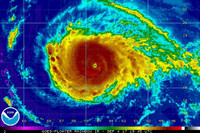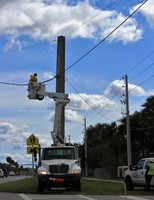


In an interview with the Recorder, American Red Cross Northeast Florida Chapter Communications Director Amber Bierfreund offered preparedness tips for area residents as Hurricane Irma inches toward Florida.
“It would be awesome if every family had a preparedness plan in case they had to evacuate at any time,” Bierfreund said. “Definitely hurricane season is the time that everyone should really start paying attention to it and stock up.
“The first thing that families want to do is decide whether or not they're in a house that they’d want to stay in or if they have to evacuate,” she added. “And that depends on where you live if you're in an evacuation zone, if the area floods, the type of structure you live in and so on.”
Bierfreund noted that families should create their own disaster supply kit and stock up on life’s essentials such as extra food and at least a gallon of water per person, per day. The American Red Cross communications director also said residents should gather important documentation and take photos of their private property for insurance purposes.
“I like to compare [preparedness] to camping; if you're planning a camping trip, nobody is going to the woods with no supplies with them,” explained Bierfreund. “Basically, planning to evacuate is almost exactly the same as planning a camping trip. You’re going to have to take bedding with you, you're going to have to take your medications with you, you’re going to have to take food and all the things you’re going to need to go camping is what needs to be in your disaster supply kit.”
The communications director stressed that evacuation notices should be taken seriously.
“Definitely, if somebody tells you to evacuate, please do so,” Bierfreund said. “If they're telling you to evacuate, then it's absolutely necessary that you evacuate. If you have the opportunity to leave a little bit sooner, that's always better.”
Additionally, Bierfreund warned that the effects of a hurricane can be felt for “very, very long periods of time” after it dissipates or leaves the area.
“A lot of people think that the hurricane is over right after it happens,” she said. “You can be without power for a very long time, you can be disconnected from your roadway, maybe you can’t get out of your neighborhood.
“So that’s another thing that people need to take into consideration when they’re thinking about whether or not to stay in their homes,” she continued. “If you stay in your home, maybe your structure is physically safe and your area doesn't flood, but you may be out of power for a few weeks after a storm and are you wanting to deal with that?”
The American Red Cross is currently “all hands on deck,” Bierfreund said, as the Northeast Florida chapter readies for Hurricane Irma.